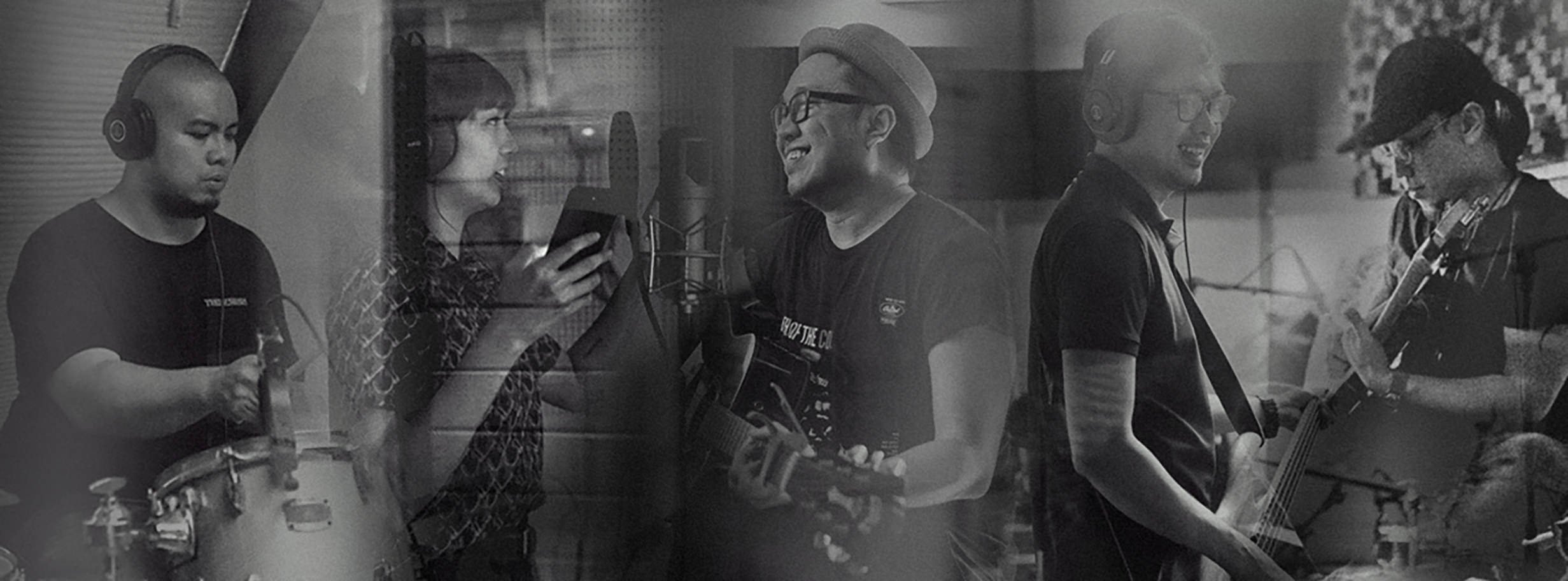Words by Ian Urrutia
Header by MC Galang
The largest misconception about folk music is that it’s entirely built on a confessional narrative, where it’s standard for the artist to expose the unfettered truth and tactile intimacy of the everyday life using the first person perspective. Sure, there’s warmth in shedding diarist thoughts as it needs to be told, unfiltered and stripped off any euphemism, and spilling one’s secrets can be therapeutic in intent. But outside of this prevailing trope in the genre, some variations have shown endearing results and achieved the same kind of vulnerability to full effect.
Pamphleteer, the indie music duo comprised of acclaimed poet/singer-songwriter/music critic Aldus Santos (The Purplechickens) and writer/musician Dee Cruz (Run Dorothy), traverses this road often less taken. Their cultivated disconnect to confessional storytelling is part of what makes their songs both surprisingly intimate and communal, and most of the time, relatable. Both artists are not afraid to play characters, stage elaborate performances that reinforce theatrical banter or soulful dialogue, and obscure the “deeply personal” with songs that humanize great literary and film heroines and villains while baring their erratic fragility, all at once.
Their latest album, Collected Fiction, represents this enormous reinforcement of narrative as a borderless concept that shouldn’t start with “I” or “We.” It can also be a persona inspired or driven by a fictional character who is just as real as the person sitting next to you, or a work of imagination that feels clearly mediated, but somehow lives through an open, intimate space between the artist and the audience, with only the curtain as divide. As Aldus Santos puts it, “The songs are mostly about remembering, and how memory is a sort of fiction, and how people in failed relationships are, ultimately, unreliable narrators. In figuring out what sort of connection these characters should have, meanwhile, I was drawn to deeply flawed, terribly compromised people. That was charming to me. That, to me, was a far cry from usual sad-bastard fare. There is danger, then defeat, then regret. But yeah, these people are, hmm, unsavory to say the very least.”
This distinct theme has already been explored in Aldus’s book of poetry, Vocalese, where he “basically played puppeteer to actual historical figures, like Albert Einstein and the mime Marcel Marceau” and adapted in The Purplechickens’ songs like the stripped-down ballad “Casanova,” where he sings from the lens of the one pined after. On Pamphleteer’s debut album, the stories that shine brighter are the ones peddled in the dark. Not necessarily aiming for authenticity or volume, but it’s completely satisfying to hear both Aldus and Dee trade verses about disappearing in the night with your partner in crime, shattering moral ascendency because it’s a sweet taste that lingers for too long like a fragrant scent, and as Dee shares in an interview with Bandwagon Asia, exposing “mature people” who deliberately make “bad decisions.”
There’s noir-like quality in its essence and purpose, where characters and monsters live in the same breadth, occupying the same body, the same soul. The central figure in Pamphleteer’s literary universe is also a person capable of loving and being unloved, hurting and being hurt. It’s us, in the time of desperation, war, and unrest; it’s someone special to us, flawed and trapped under incredible circumstances, whom we want to save and protect from harm. Astonishingly, as Aldus and Dee sing about the personas portrayed, they’re visibly committed to the excess that comes from this staggering push-and-pull dynamics; their vocals shifting from wraithlike to maddeningly infatuated, from showing no signs of remorse to grappling with the fear of being caught. They’re reliable actors with egos as big as ours, and with complicated motivations that drive them to the edge of sanity. Dee shares, “We made sure that every word in every song was felt, be it sadness, longing, love, or resentment. When it came to our voices, I think that I provided a gentle and delicate balance to Aldus’ highly emotional parts, and we’re really excited to finally share this dynamic to everyone.”
It helps that at the helm of this conceptual undertaking is producer Audry Dionisio, whose credit includes working on songs and albums by The Itchyworms and Apartel. No stranger to producing work by artists whose larger-than-life narratives and profound musical capacity needed a touch of timing and nuance, Audry has an ear for mood and detail. This allows the record to parade its unmistakable brooding quality without resorting to histrionics. “Audry Dionisio was efficient, had great ideas, and worked at a tireless pace,” Aldus reveals. “This was a very quick record to make, thanks in no small measure to our producer Audry Dionisio’s mad skills, vision, and patience. She handled those sessions at Crow’s Nest like a boss, but also like an angel.”
“We made sure that every word in every song was felt, be it sadness, longing, love, or resentment. When it came to our voices, I think that I provided a gentle and delicate balance to Aldus’ highly emotional parts, and we’re really excited to finally share this dynamic to everyone.”
Pamphleteer also takes pride of its team of talented musicians such as Zig Rabara (Ang Bandang Shirley, The Purplechickens), Marco de Leon (Reklamo) and Jun Ballesteros, whose contribution holds importance to the subdued alt country/folk styling of Collected Fiction—be it the simmering sorcery in Marco’s guitar playing on the self-titled track and the excellent “Drunk and Bored,” or the balance between Zig’s controlled drumming and Jun’s ethereal basslines. With a little help from their musician-friends, Japo Anareta (Tanya Markova), Miggy Abesamis (Musical O), and Migs Querubin (Fools and Foes), and guidance from Audry and Ely Buendia, not a day goes by without appreciating these watershed moments that define the songs, however small the flourishes are, and intimate the mood speaks. “As for the sound, we just wanted the record to sound like a room and not like, hmm, data. And Audry and Ely made sure we got it,” Aldus adds.
In the private corners of where Collected Fiction was made, it’s impressive how Pamphleteer masterfully connects imagined human experiences with the universal. Sure, it’s equally as resonant and important as the great confessional records of the modern times, but in its unfolding of fragmented memories as a vessel to tell emotional truths that are far removed from the songwriter’s vantage point or experience, and in its presentation of complex characters seduced by self-destructive tendencies and emotional desires, we are reminded of a life lived through cracks and tainted walls, some parts of it mimicking ours unintentionally, or someone we know from the heart. Aldus and Dee need to tell these stories, and sing these blues. It’s life as we know it.
Stream Collected Fiction








